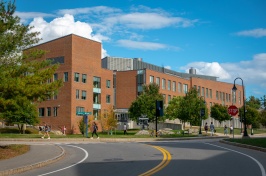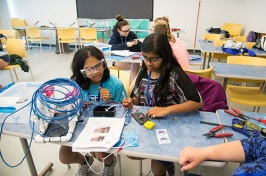The University of New Hampshire is a flagship research university that inspires innovation and transforms lives in our state, nation and world. More than 16,000 students from all 50 states and 71 countries engage with an award-winning faculty in top ranked programs in business, engineering, law, health and human services, liberal arts and the sciences across more than 200 programs of study. UNH’s research portfolio includes partnerships with NASA, NOAA, NSF and NIH, receiving more than $100 million in competitive external funding every year to further explore and define the frontiers of land, sea and space.
UNH Research Finds Organic Pesticides Help Save Brussels Sprouts from Pests

Researchers studied the issue of aphid infestations of Brussels sprouts at the UNH Woodman Horticultural Research Farm, a facility of the NH Agricultural Experiment Station. Credit: Becky Sideman/UNH
DURHAM, N.H. – New research from the University of New Hampshire shows that organic pesticides can be effective in managing severe infestations of cabbage aphids, which can virtually destroy a crop of Brussels sprouts.
“In recent years, we performed experiments comparing different varieties of Brussels sprouts as well as different growing practices,” said Becky Sideman, extension professor of sustainable horticulture production. “In these experiments, we observed severe infestations of cabbage aphid. Although our research did not focus on the aphids, they were quite a nuisance and rendered most sprouts unmarketable. From conversations with growers in the region, we came to realize that many growers, especially organic growers, were struggling with cabbage aphid management.”
Sideman’s undergraduate student Talia Levy studied the issue of aphid infestations of Brussels sprouts for her senior thesis, comparing two methods of managing cabbage aphids: intercropping with flowers that provide habitat for naturally-occurring aphid predators, and using organic insecticides, alternating between insecticidal soap, and a combination of azadirachtin and pyrethrins.
“While we observed lots of aphid predators and parasites on the flowering plants, they did not provide sufficient control of cabbage aphids. On the other hand, weekly scouting and application of organic pesticides when economic thresholds were reached did provide good control of cabbage aphid,” the researchers said.
This material is based upon work that is supported by the National Institute of Food and Agriculture, U.S. Department of Agriculture, under award number 228522. For additional information on this research project, visit https://extension.unh.edu/resources/files/Resource006332_Rep9072.pdf.
Founded in 1887, the NH Agricultural Experiment Station at the UNH College of Life Sciences and Agriculture is UNH’s original research center and an elemental component of New Hampshire's land-grant university heritage and mission.
PHOTOS AVAILABLE FOR DOWNLOAD
https://colsa.unh.edu/nhaes/sites/colsa.unh.edu.nhaes/files/media/images/brussels.jpg
https://colsa.unh.edu/nhaes/sites/colsa.unh.edu.nhaes/files/media/images/field.jpg
Researchers studied the issue of aphid infestations of Brussels sprouts at the UNH Woodman Horticultural Research Farm, a facility of the NH Agricultural Experiment Station. Credit: Becky Sideman/UNH
https://colsa.unh.edu/nhaes/sites/colsa.unh.edu.nhaes/files/media/images/infestedsprouts.jpg
https://colsa.unh.edu/nhaes/sites/colsa.unh.edu.nhaes/files/media/images/cabbageaphids.jpg
Brussels sprouts infested with cabbage aphid, which can render most sprouts unmarketable. Credit: Becky Sideman/UNH
-
Media Contact
Lori Tyler Gula, PhD | NH Agricultural Experiment Station | lori.gula@unh.edu | 603-862-1452
Latest News
-
October 8, 2025
-
October 2, 2025
-
September 24, 2025
-
September 15, 2025
-
August 21, 2025















































